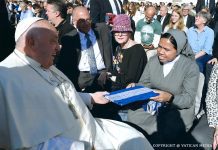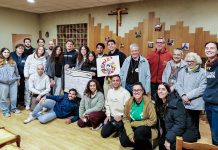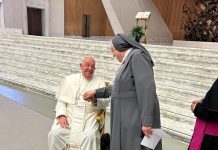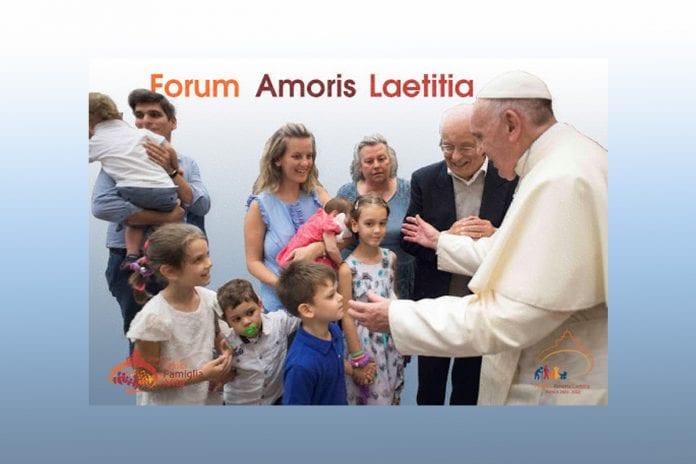Rome (Italy). The online forum “Where are we with Amoris Laetitia? Strategies for the pastoral application of the Exhortation of Pope Francis,” promoted by the Dicastery for the Laity, Family and Life in the Year “Family Amoris Laetitia”, as a moment of reflection on the present and future of family ministry.
The online forum, in which about 350 persons responsible for Family Pastoral participate, representing more than 60 Episcopal Conferences and over 30 International Ecclesial Associations and Movements, is a time of dialogue in a synodal style on the experiences and perspectives of implementing the Apostolic Exhortation aimed at supporting the application of Amoris Laetitia in the various contexts of the world in a pastoral and missionary key.
In the Video message addressed to the participants on 9 June 2021, Pope Francis highlights the continuity with the synodal journey and the style of discernment and cooperation essential to reach families:
“The Exhortation Amoris laetitia is the fruit of an in-depth synodal reflection on marriage and the family and, as such, requires patient work in implementation and missionary conversion. This Forum is positioned in continuity with the synod path, which must be able to be implemented in the local Churches and which requires cooperation, sharing of responsibility, the capacity for discernment and willingness to be close to families”.
In times of pandemic, in which the life of families is torn by difficulties, the Pope urges those in charge of pastoral care to focus on listening to and involving families as active subjects of evangelization and as concrete witnesses for young people:
“To bring God’s love to families and young people, who will build the families of tomorrow, we need the help of the families themselves, their concrete experience of life and communion. We need spouses alongside the pastors, to walk with other families, to help those who are weaker, to announce that, even in difficulties, Christ is present in the Sacrament of Marriage to give tenderness, patience and hope to all, in every situation of life. How important it is for young people to see with their own eyes the love of Christ alive and present in the love of spouses, who testify with their real lives that love for ever is possible!”.
Pope Francis invites the participants to take up the Apostolic Exhortation again as a working tool, “to identify, among the pastoral priorities indicated therein, those that best correspond to the concrete needs of each local Church and to pursue them with creativity and missionary zeal.” He recalls the importance of the formation of the laity, in particular of spouses and families, so that they acquire ever more awareness of the gift received in the sacrament of marriage and of the mission entrusted to them.
“So many families are unaware of the great gift they have received in the Sacrament, an effective sign of Christ’s presence which accompanies every moment of their lives. When a family fully discovers this gift, it feels the desire to share it with other families, because the joy of the encounter with the Lord tends to spread and generates other communion; it is naturally missionary”.
Cardinal Kevin Farrell, Prefect of the Dicastery, opened the Forum’s work, wishing the participants fruitful days that are “a concrete sign of the commitment, as a Church, to placing the family at the center and putting oneself at its service, (…) in the certainty that ‘the Church is good for the family, the family is good for the Church’ (AL 87 )”.
The Secretary of the Dicastery, Fr. Alexandre Awi Mello, starting from the question “Where are we with Amoris Laetitia?” offered a detailed analysis of the dissemination of the Apostolic Exhortation throughout the world, obtained from the information collected in the 5 comparison with the Episcopal Conferences, highlighting some initiatives that have arisen and the renewal of pastoral care generated by it.
The Forum went live with the thematic sessions:
Dr. Gabriella Gambino, Undersecretary for the Family and Life of the Dicastery, dealt with the theme “The catechumenate for marriage”, as an itinerary that allows engaged couples to live the sacrament more consciously, underlining the importance of the formation of “those who accompany married couples, priests, and, in general, pastoral workers so that they have a formation and a style of accompaniment suitable for the catechumenal path,” not only in transmitting notions, but also in “guiding, helping, and being close to couples along a path to walk together”.
The theme “The formation of the accompaniers” was explored by the spouses David and Nicoletta Oreglia Musso (Italy), presidents of the “Spouses in Christ” Association, who spoke about the accompaniment of formators who take care of couples and families as “a challenge to light and shadow,” in which is appreciated “the value of wisdom in the relationships that the Church has woven over the years.”
Spouses Luis and Pilar Jensen (Chile), consultors of the Dicastery, spoke about the “Education of children“, the theme of Chapter 7 of Amoris Laetitia, starting from three questions: “Do our children feel loved? Do our children know how to love? Do our children feel loved by God?”.
Fr. Renzo Bonetti, spiritual assistant of the Great Mystery Project, and former Director of the National Office for the Pastoral Care of the Family of the Italian Episcopal Conference, treated “Conjugal spirituality” as “a real and effective decision to transform two paths into one road” (AL 132) “that is built day by day in a path dotted with small and large gestures of the working life, in which the Lord awaits the spouses ‘to bring them to the heights of mystical union’ (AL 316)”.
The natural consequence of a well-lived conjugal spirituality, Marie Gabrielle and Emanuel Ménager (France), consultors of the Dicastery, highlighted “Family missionary spirit”: spouses, with their union, are called to “actualize today, in every environment of life, the relationship of love with humanity and of Christ with the Church, becoming ‘a symbol, witness, participation in the motherhood of the Church’ (AL 324)”.
In the last thematic session, “The fragility of families”, Archbishop Victor Fernandez, Archbishop La Plata (Argentina) will talk about pastoral paths to “Accompany, discern, and integrate fragility”.
Each session is accompanied by experiences and good practices, implemented in the pastoral and ecclesial realities of the world, which help to understand and translate the topics addressed in the reports into concrete paths.
The summary of each day is posted on the websites www.amorislaetitia.va and www.laityfamilylife.va.




















